Jacksonville’s Prime F. Osborn III Convention Center Receives Extensive Facelift
The Prime F. Osborn III Convention Center in Downtown Jacksonville is undergoing renovations to improve appearance and functionality for its convention and meeting spaces.
The renovations include the Grand Lobby and Ballroom, which will see new carpet, cabinetry, marble walls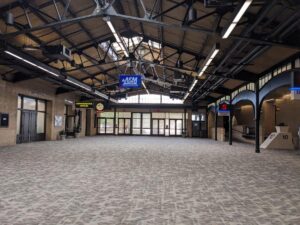 resealing, programmable uplighting, and fresh paint, and the main concourse area features a new digital display system. Additionally, several meeting spaces will receive new lighting systems, fresh carpet, and acoustic panels. Exterior building updates include painting trim and a new roof.
resealing, programmable uplighting, and fresh paint, and the main concourse area features a new digital display system. Additionally, several meeting spaces will receive new lighting systems, fresh carpet, and acoustic panels. Exterior building updates include painting trim and a new roof.
What is now known as the Prime F. Osborn III Convention Center originally opened in 1919 as the largest railroad station in the south, the Jacksonville Union Terminal. It featured more than two dozen rail tracks, a restaurant, gift shop, and other amenities. Today, the Prime maintains some of its historical features including a retired rail car, train bumpers, and signage.
“The Prime” features 78,000 square feet of exhibit space with 33 foot ceilings and 22 meeting rooms of various sizes. The Grand Lobby is a special event space, with 75 foot ceilings and marble walls, overlooking the grand fountain and expansive terminal columns.
Iconic Design Revealed for Geelong’s New Convention Centre as Preferred Bidder Announced
The Geelong Convention and Exhibition Centre precinct development is a step closer to reality with the selection of the preferred bidder to deliver the much-anticipated project, along with the unveiling of proposed designs.
Minister for Regional Development Harriet Shing joined City of Greater Geelong Mayor Trent Sullivan to  announce Plenary Conventions has been appointed to lead the project and will soon start on what will be one of the biggest developments in regional Victoria.
announce Plenary Conventions has been appointed to lead the project and will soon start on what will be one of the biggest developments in regional Victoria.
“With a waterfront precinct that rivals any in the country, this convention center precinct will add to Geelong’s status as a UNESCO City of Design and attract even more people to come and explore all this wonderful city has to offer,” Shing said. “Delivering the project will also be a major boost to the region, generating hundreds of jobs and injecting millions of dollars into the local economy.”
The Victorian Government is investing more than $260 million into the project as part of the Geelong City Deal, with additional contributions of $30 million from the Australian Government and $3 million from the City of Greater Geelong.
The Plenary Conventions consortium will transform the 1.6-hectare waterfront car parking site into a precinct that welcomes locals and visitors alike as part of the Public Private Partnership. The consortium comprises the Plenary Group as sponsor and investor, Built as builder, Woods Bagot as architect, BGIS as services contractor, and Quintessential Equity as developer.
The development of this world-class facility and precinct has included extensive stakeholder consultation and ongoing work with the Wadawurrung Traditional Owners Aboriginal Corporation on critical aspects of the precinct’s design, identity, and recognition of local cultural heritage.
It will include the construction of the purpose-built convention and exhibition space, incorporating a 1000 seat venue, two large exhibition spaces, meeting rooms, conference facilities, and flexible event spaces.
The precinct will also be home to retail spaces for food and beverage offerings and a large public plaza that promises to become a feature of the Geelong waterfront. In a boost for Geelong’s up-market accommodation stocks the development will also include a 200-room hotel under the internationally renowned Crowne Plaza brand.
The investment will be a major driver of jobs and economic growth for the City of Greater Geelong and surrounding areas. It will support 600 jobs during construction and an additional 270 ongoing jobs once the precinct is complete.
To ensure lasting benefits to the region beyond the centre itself, the Government is supporting local organisation gforce to recruit up to 30 new local apprentices and trainees who are experiencing disadvantage in entering the workforce.
Apprentices will be employed full-time for the duration of their apprenticeship and until they secure full-time employment with private contractors.
The Plenary Conventions consortium has a proven track record developing and maintaining the Melbourne Convention and Exhibition Centre and enhancing the South Wharf precinct for nearly 20 years.
The Trust that operates Melbourne Convention and Exhibition Centre will also manage and operate the new Geelong Convention and Exhibition Centre, once complete. The two centres will cement Victoria as a premier global destination for events.
Preliminary works on the site are underway and construction is set to begin shortly, with completion of the convention centre and hotel in early 2026.
The precinct development is the centerpiece of the Geelong City Deal – a $500+ million commitment between the Australian and Victorian governments and the City of Greater Geelong. It is revitalizing the city and regional economy, encouraging visitors to spend more time in the region by capitalizing on its natural assets.
Fanatics Sportsbook to Open at Nationwide Arena
By nhl.com
Fanatics Betting and Gaming, the online and retail sports betting division of the Fanatics digital sports platform, announced upcoming plans to open a retail sportsbook location in partnership with the Columbus Blue Jackets in Columbus’ Arena District.
“The Columbus Blue Jackets are constantly seeking new and exciting ways to engage with our fans,” said  Blue Jackets Sr. Vice President and Chief Operating Officer Cameron Scholvin. “We believe this collaboration with Fanatics Betting and Gaming on a world-class sportsbook location just outside the doors of Nationwide Arena in the heart of the Arena District does just that.”
Blue Jackets Sr. Vice President and Chief Operating Officer Cameron Scholvin. “We believe this collaboration with Fanatics Betting and Gaming on a world-class sportsbook location just outside the doors of Nationwide Arena in the heart of the Arena District does just that.”
The Fanatics Sportsbook will be located at 401 North Front Street adjacent to Nationwide Arena. The main entrance is located in the alleyway immediately north of the entrances to Buca di Beppo and Starbucks. It is scheduled to open its doors at the end of August.
“We’re thrilled to be partnering with the Blue Jackets to bring a world-class retail experience to the arena district in downtown Columbus,” said Ari Borod, Chief Business Officer, Fanatics Betting and Gaming. “The Jackets are one of the youngest teams in the league, and we are excited to leverage our partnership to grow with them and complement our online sports betting experience that is currently being beta-tested in Ohio.”
The newly designed sportsbook is more than 5,000 square feet and features four betting windows, 14 self-service betting kiosks, one giant LED Video Wall, 16 TV monitors and a full-service restaurant with food options that every sports fan will enjoy. The Fanatics Sportsbook Columbus will offer viewing experiences and legal betting markets for all major sports including professional and college football, basketball, hockey, baseball, alongside tennis, soccer, golf, MMA and boxing. The development and trading of sports betting markets will be done in-house at Fanatics Betting and Gaming and supported by a number of world-class trading suppliers.
The Fanatics Sportsbook continues its online beta testing with Fanatics customers in Ohio. The Fanatics Sportsbook app is available for download on iOS and Android, but a code is needed to access the sportsbook and is currently only available to Fanatics customers at this time.
The Gavel Travels From Adina Erwin, CVE, to Kerry Painter, CVE
By R.V. Baugus
Adina Erwin, CVE, wrapped up her productive year as IAVM Chair by passing the gavel to Kerry Painter, CVE, to for the most part conclude activities during VenueConnect.
Erwin recounted her most recent column in Venue Professional magazine in which she equated the role of chair to a four-person relay race.
“The role (of chair) is like running a relay race to emerge stronger out of the pandemic,” Erwin said. 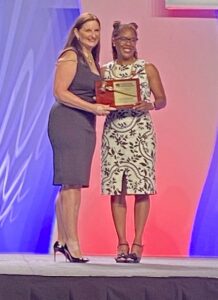 “Each leader has a different role. Coming out of the pandemic we were blessed to have four people who had a different role in the race but with the same objective — win the race.” Those four, of course, were Eric Hart, CVE, Tammy Koolbeck, CVE, Rip Rippetoe, CVE, and Painter.
“Each leader has a different role. Coming out of the pandemic we were blessed to have four people who had a different role in the race but with the same objective — win the race.” Those four, of course, were Eric Hart, CVE, Tammy Koolbeck, CVE, Rip Rippetoe, CVE, and Painter.
“IAVM navigated this tough time in keeping its promises to its members,” Erwin said.
Painter took the stage and accepted the gavel from Erwin before beginning her remarks. “Our focus is continued sustainability of IAVM,” she said. “Instead of new themes, like the relay race it continues on.
“My word is ‘belonging,'” she added. “In collaboration with the CEO (Brad Mayne, CVE), my intention is to make the group members feel this organization is a benefit to them. This membership is your way in. We want to make sure this membership is beneficial to all.”
Painter talked about diversity initiatives and the work that consultant Zoe Moore and University of Kentucky’s Jill Schinberg is doing for IAVM in this area.
Finally, Painter talked about how IAVM has benefited her through the years.
“I know in my heart that I owe every job I have had to IAVM,’ she said. “All I know about running first-class venues has been due to IAVM.”
Award-winning Trio Earn Their Due Recognition
By R.V. Baugus
Experience counts. And when you add the combined years of industry experience for the newest-minted IAVM winners of the Charles A. McElravy Award, Joseph J. Anzivino Distinguished Allied Award, and IAVM Foundation Legacy Award, there are none better than iconic veterans Beth Wade, CVE, Richard Andersen, CVE, and Tom Cornwall, CVE, who respectively were honored on Wednesday morning during VenueConnect.
Cornwall took the stage first to accept the Foundation Legacy Award. The Retired member encouraged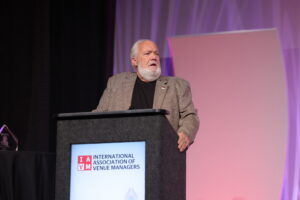 those in the large crowd to do what he did, begin donating to the Foundation with what you can and increase from there. Wise words from one who served as co-chair of the Foundation Silent Auction in 1997-98 and has supported the Foundation since the mid-1980’s.
those in the large crowd to do what he did, begin donating to the Foundation with what you can and increase from there. Wise words from one who served as co-chair of the Foundation Silent Auction in 1997-98 and has supported the Foundation since the mid-1980’s.
“I learned early on that the Foundation doesn’t just exist,” Cornwall said. “It needs our help and support. I got in the habit of giving annually so programs could continue in developing new ideas. If you’re getting started, consider reaching in your pocket and giving $10 or $15 a month.”
Cornwall retired after a 44-year career and during the 2020 pandemic worked in Edmonton in the National Hockey League “bubble” during the Stanley Cup playoffs, where he “hibernated” for 92 days.
“I consider this my Stanley Cup,” Cornwall appropriately said.
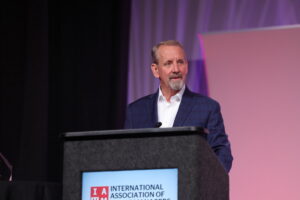 Richard Andersen – speaking of appropriate – was introduced by Russ Simons, CVE as a “hybrid” who has served on both the Professional and Allied side of the industry. Along with his better half, Kim Bedier, CVE, who also introduced Andersen, the remarks from the honoree touched on many of the consistencies in his life that have enabled Andersen to become one of the industry’s most highly regarded and successful practitioners.
Richard Andersen – speaking of appropriate – was introduced by Russ Simons, CVE as a “hybrid” who has served on both the Professional and Allied side of the industry. Along with his better half, Kim Bedier, CVE, who also introduced Andersen, the remarks from the honoree touched on many of the consistencies in his life that have enabled Andersen to become one of the industry’s most highly regarded and successful practitioners.
“So many people have come alongside me in my career,” Andersen said. “All of us have special ones in our life.”
Andersen asked the audience for 15 seconds of silence to reflect on those who have helped them in their lives and careers. “Whomever you were thinking of, imagine how pleased they are right now,” Andersen said.
“’Things’ didn’t make me any happier,” Andersen said. “I learned a long time ago to check my ego at the door, as Russ would say.”
Before finishing his introduction to Charles A. McElravy Award winner Beth Wade, Michael Marion, CVE, was compelled to share one story from a Region 5 story involving Wade, noting that she referred to him as “my best girlfriend in a macho kind of way.” (Note: Marion introduced Wade as “my best boyfriend in a girlie kind of way.”)
“I am extremely humbled,” Wade said. “I am extremely proud to have been an IAVM member since 1981. I 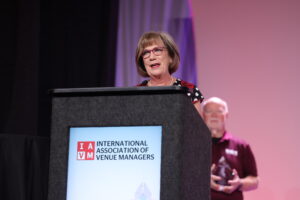 have learned through the years that we have the ability to make change a reality.”
have learned through the years that we have the ability to make change a reality.”
Wade stressed the importance of completing surveys when IAVM sends them. She also stressed the value of earning the CVP or CVE designation. “I encourage you to get certified to communicate your value of venue professionalism.”
“When I think about the true pluses of IAVM I know I can pick up the phone and call anyone in the world,” she continued. “It is what make us unique, special, and why IAVM was formed.”
Speaking of the Association’s formation, Wade talked about her days working in Memphis and about award namesake McElravy and his work in Memphis. Wade said that McElravy was one of the early creative agents of change in the industry.
“I found an IAVM book from 1925-75 with references to McElravy when he took his job at the civic center,” she said. “He laid pipes on the floor of the civic center to do ice shows.”
“My support for IAVM will not end when I go to the Arena in the sky” Wade concluded. “I would like for scholarships to be established to help members from tertiary markets be able to go to schools and programs.”
Do you want to receive a Front Row News weekly digest?
Categories
- Allied (861)
- Architecture (147)
- Arenas (747)
- Career (897)
- Convention Centers (895)
- Education (623)
- Events (1,544)
- Food & Beverage (193)
- Foundation (113)
- Guest Experience (1,496)
- Industry News (2,270)
- Leadership (1,888)
- Marketing (150)
- Membership (2,000)
- Music (213)
- Performing Arts Centers (454)
- Professional Development (409)
- Research (127)
- Safety & Security (442)
- Sports (763)
- Stadiums (608)
- Student (159)
- Technology (516)
- Ticketing (92)
- Touring (82)
- Trends (364)
- Uncategorized (723)
- Universities (218)
- Video (25)
- Young Professional (198)
Twitter Feed
- Twitter feed loading
Recent Posts
- The Events Industry Council Recognizes the Miami Beach Convention Center (MBCC) for Achieving Gold Level Sustainability Certification
- Raleigh Convention Center Shares Designs of Upcoming Expansion
- Acrisure Arena Wraps ‘Magnificent 7’ with Record-Setting Week of Live Entertainment, Welcoming Fans from All 50 States
- Welcome to Our Newest Members
- Transform Your Venue Operations with AI
Categories
- Allied
- Architecture
- Arenas
- Career
- Convention Centers
- Education
- Events
- Food & Beverage
- Foundation
- Guest Experience
- Industry News
- Leadership
- Marketing
- Membership
- Music
- Performing Arts Centers
- Professional Development
- Research
- Safety & Security
- Sports
- Stadiums
- Student
- Technology
- Ticketing
- Touring
- Trends
- Uncategorized
- Universities
- Video
- Young Professional
Archives
- October 2025
- September 2025
- August 2025
- July 2025
- June 2025
- May 2025
- April 2025
- March 2025
- February 2025
- January 2025
- December 2024
- November 2024
- October 2024
- September 2024
- August 2024
- July 2024
- June 2024
- May 2024
- April 2024
- March 2024
- February 2024
- January 2024
- December 2023
- November 2023
- October 2023
- September 2023
- August 2023
- July 2023
- June 2023
- May 2023
- April 2023
- March 2023
- February 2023
- January 2023
- December 2022
- November 2022
- October 2022
- September 2022
- August 2022
- July 2022
- June 2022
- May 2022
- April 2022
- March 2022
- February 2022
- January 2022
- December 2021
- November 2021
- October 2021
- September 2021
- August 2021
- July 2021
- June 2021
- May 2021
- April 2021
- March 2021
- February 2021
- January 2021
- December 2020
- November 2020
- October 2020
- September 2020
- August 2020
- July 2020
- June 2020
- May 2020
- April 2020
- March 2020
- February 2020
- January 2020
- December 2019
- November 2019
- October 2019
- September 2019
- August 2019
- July 2019
- June 2019
- May 2019
- April 2019
- March 2019
- February 2019
- January 2019
- December 2018
- November 2018
- October 2018
- September 2018
- August 2018
- July 2018
- June 2018
- May 2018
- April 2018
- March 2018
- February 2018
- January 2018
- December 2017
- November 2017
- October 2017
- September 2017
- August 2017
- July 2017
- June 2017
- May 2017
- April 2017
- March 2017
- February 2017
- January 2017
- December 2016
- November 2016
- October 2016
- September 2016
- August 2016
- July 2016
- June 2016
- May 2016
- April 2016
- March 2016
- February 2016
- January 2016
- December 2015
- November 2015
- October 2015
- September 2015
- August 2015
- July 2015
- June 2015
- May 2015
- April 2015
- March 2015
- February 2015
- January 2015
- December 2014
- November 2014
- October 2014
- September 2014
- August 2014
- July 2014
- June 2014
- May 2014
- April 2014
- March 2014
- February 2014
- January 2014
- December 2013
- November 2013
- October 2013
- September 2013
- August 2013
- July 2013
- June 2013
- May 2013
- April 2013
- March 2013
- February 2013
- January 2013
- May 2012
- March 2012
- December 2011
- November 2011
- October 2011
Recent Comments
- Frank Bradshaw, Ph.D., CVE on John Meyer, CVE, a Tireless Advocate of Certification for Venue Professionals, Has Died
- Neil Sulkes on Hilary Hartung, Friend to Many in Venue Marketing, Has Left Us
- Jason Parker, CVE on The Devastation of Hurricane Helene and How We Can Support One Another
- Larry Perkins on Touhey Testifies Against Speculative Ticketing Before Congressional Subcommittee
- Peter Secord on Major Players for Planned Elkhart Amphitheater Were in the Mix at VenueConnect
